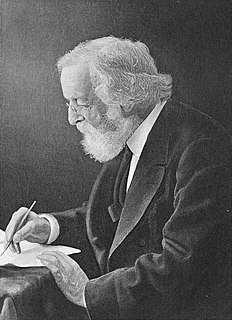A Quote by Herbert Spencer
The existence of a first cause of the universe is a necessity of thought ... Amid the mysteries which become more mysterious the more they are thought about, there will remain the one absolute certainty that we are over in the presence of an Infinite, Eternal Energy from which all things proceed.
Related Quotes
Rational thinking which is free from assumptions ends therefore in mysticism. To relate oneself in the spirit of reverence for life to the multiform manifestations of the will-to-live which together constitute the world is ethical mysticism. All profound world-view is mysticism, the essence of which is just this: that out of my unsophisticated and naïve existence in the world there comes, as a result of thought about self and the world, spiritual self-devotion to the mysterious infinite Will which is continuously manifested in the universe.
There is a thinking stuff from which all things are made, and which, in its original state, permeates, and fills the inter spaces of the universe.
A thought in this substance, Produces the thing that is imaged by the thought.
Man can form things in his thought, and by impressing his thought upon formless substance, can cause the thing he thinks about to be created.
That which you have received, you should be grateful for it. And the most beautiful phenomenon is that when you are grateful, existence starts pouring more and more over you. It becomes a circle: the more you get, the more you become grateful; the more you become grateful, the more you get... And there is no end to it, it is an infinite process.
This is what writers mean when they say that the notion of cause involves the idea of necessity. If there be any meaning which confessedly belongs to the term necessity, it is unconditionalness. That which is necessary, that which must be, means that which will be, whatever supposition we may make in regard to all other things.
Death is not earnest in the same way the eternal is. To the earnestness of death belongs precisely that remarkable capacity for awakening, that resonance of a profound mockery which, detached from the thought of the eternal, is an empty and often brash jest, but together with the thought of the eternal is just what it should be, utterly different from the insipid solemness which least of all captures and holds a thought with tension like that of death.
The only difference between causation and the value is that the word "cause" implies absolute certainty whereas the implied meaning of "value" is one of preference. In classical science it was supposed that the world always works in terms of absolute certainty and that "cause" is the more appropriate word to describe it. But in modern quantum physics all that is changed. Particles "prefer" to do what they do. An individual particle is not absolutely committed to one predictable behavior. What appears to be an absolute cause is just a very consistent pattern of preferences.
Shakespeare was an intellectual ocean, whose waves touched all the shores of thought; within which were all the tides and waves of destiny and will; over which swept all the storms of fate, ambition and revenge; upon which fell the gloom and darkness of despair and death and all the sunlight of content and love, and within which was the inverted sky lit with the eternal stars -- an intellectual ocean -- toward which all rivers ran, and from which now the isles and continents of thought receive their dew and rain.
Each thing that exists remains forever, and that very existence of existence is proof of its eternity. But without that realization, which is the knowledge of perfect being, man would never know whether there was existence or non-existence. If eternal existence is altered, then it must become more beautiful; and if it disappears, it must return with more sublime image; and if it sleeps, it must dream of a better awakening, for it is ever greater upon its rebirth.
For, the sense of being which in calm hours rises, we know not how, in the soul, is not diverse from things, from space, from light, from time, from man, but one with them, and proceeds obviously from the same source whence their life and being also proceed. We first share the life by which things exist, and afterwards see them as appearances in nature, and forget that we have shared their cause. Here is the fountain of action and of thought.
Everybody knows what celebration is. I have never come across a person who does not know what celebration is. Just rejoicing in your being, just rejoicing in this moment, this tremendous universe. You had not asked for it, you have simply been given a universe which is infinite and eternal. You have not asked and you have been given a consciousness which is eternal, which can become festive. If you allow it, it can make you the sanest, the most graceful, the most loving.
To affirm life is to deepen, to make more inward, and to exalt the will-to-life. At the same time the man who has become a thinking being feels a compulsion to give every will-to-live the same reverence for life that he gives to his own. He experiences that other life as his own. He accepts as being good: to preserve life, to raise to its highest value life which is capable of development; and as being evil: to destroy life, to injure life, to repress life which is capable of development. This is the absolute, fundamental principle of the moral, and it is a necessity of thought.






































